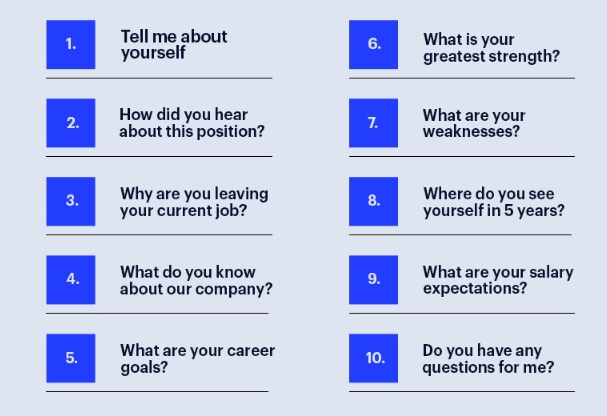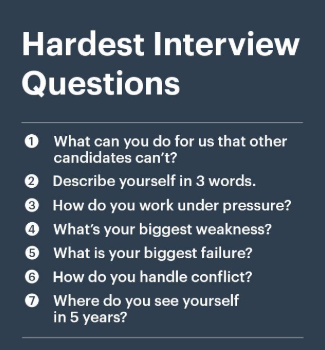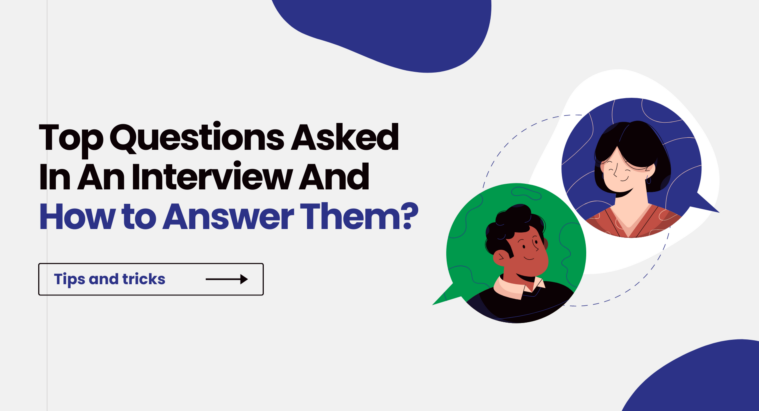Job interviews, often the most nerve-wracking part of the hiring process, can be navigated confidently and effectively through proper preparation. Understanding the most common top interview questions and knowing how to respond is not just a key, but the key to success. Here, we present some top interview questions you’ll likely face and tips on answering them.
Tell Me About Yourself.
This question often opens an interview and can set the tone for the entire conversation. The interviewer seeks a concise summary of your professional background, skills, and what motivates you.
How to answer: It’s crucial to keep your response to this question brief. By focusing on your professional experience, key accomplishments, and how your background makes you a strong fit for the role, you can maintain the interviewer’s interest. There’s no need to delve into personal details or irrelevant job history.
Example:
” So, I’m a marketing professional with almost five years of experience in digital marketing. I’ve worked in both B2B and B2C settings, focusing on SEO and content strategy. In my previous role, I helped increase website traffic by 40% within six months. Moreover, I’m excited about the opportunity to bring my skills to your team, as my experience aligns well with the goals of this position.
Why Should We Hire You?
This is your chance to highlight your unique strengths and explain why you’re the best fit for the role. However, the interviewer wants to know what differentiates you from other candidates.
How to answer: Focus on the skills, experience, and personal traits that make you stand out. Tie your strengths directly to the job description and company needs.
Example:
“With my strong background in project management and proven track record of leading cross-functional teams, I can hit the ground running. I’m highly organized and thrive in fast-paced environments, which I know will help me contribute to your team’s success. Additionally, I have experience working with the tools and technologies you use, which would allow me to make an immediate impact.”
What Is Your Greatest Strength?
This classic question allows you to demonstrate your self-awareness and confidence.
How to answer: Choose a strength that aligns with the job requirements and gives you an edge. Be specific and provide an example to back it up.
Example:
” So, my greatest strength is to stay organized and manage multiple priorities simultaneously. For instance, in my last role, I was responsible for managing several client accounts simultaneously. I implemented a detailed project management system that helped me meet deadlines consistently, and it also improved team communication.”

What Is Your Greatest Weakness?
This question can be tricky, but it’s an opportunity to show that you’re self-aware and committed to personal growth.
How to answer: Choose a weakness that won’t negatively impact your ability to do the job. Follow up by explaining what steps you’ve taken to improve it.
Example:
“I sometimes take on too much responsibility because I like to help wherever I can. However, I’ve learned to delegate more effectively and prioritize tasks to ensure I’m working most efficiently. I’ve also been taking a course on time management to further develop this skill.”
Where Do You See Yourself in Five Years?
Employers ask this question to gauge your long-term interest in the role and career ambitions.
How to answer: Focus on your professional growth and how the position aligns with your long-term goals. Avoid mentioning anything that could suggest you plan to leave the company soon.
Example:
” So, in five years, I see myself taking on more responsibility within the company, possibly in a leadership role. I’m excited about developing my skills in [specific area relevant to the job] and contributing to the company’s long-term success. I’d love to grow within a company that values internal development, and I see this role as an excellent opportunity to learn and advance.”
Tell Me About a Time You Faced a Challenge at Work and How You Handled It.
Behavioural questions like this are common because they reveal how you approach problems in the workplace.
How to answer: Use the STAR method—Situation, Task, Action, and Result. This structure will help you give a clear, concise answer.
Example:
“At my previous job, we were working on a tight deadline for a product launch. The team faced unexpected challenges when a key component was delayed. I took the initiative to communicate directly with the vendor to expedite the shipment and reorganized the project timeline to ensure the launch was still on track. As a result, we were able to meet the deadline and launch the product successfully.”

Conclusion
Being prepared for common top interview questions is essential for making a positive impression. The key to answering questions confidently is practice and self-reflection. Remember, it’s not just about knowing the right answers top interview questions , but also about understanding how your experiences and skills can contribute to the role. Focusing on your strengths, being honest about your weaknesses, and always tying your answers back to how you can contribute to the role will help the company show interviewers that you’re ready to take on the position and add value to their team.







